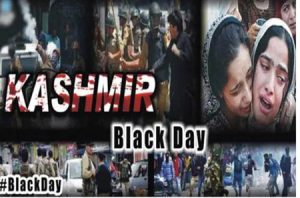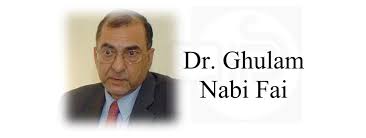Kashmir Black Day: Decades of unresolved conflict and human rights violations
Syed Zulqurnain Ali Naqvi
 The Kashmir conflict, which ignited on October 27, 1947, with the deployment of Indian troops into the valley, remains one of the most enduring and volatile geopolitical crises in modern history. This day, commemorated as Kashmir Black Day, marked the beginning of a protracted conflict rooted in the disputed accession of Jammu and Kashmir to India by Maharaja Hari Singh, against the aspirations of its Muslim-majority population. The region’s struggle for self-determination has since been characterized by decades of militarization, human rights abuses, and international diplomatic deadlock. Despite UN resolutions for a plebiscite, the Kashmir conflict has escalated into a strategic flashpoint between nuclear-armed India and Pakistan. The 2019 revocation of Article 370 worsened the crisis, amplifying India’s settler-colonial policies and curbing Kashmir’s autonomy, while the global community remains largely passive.
The Kashmir conflict, which ignited on October 27, 1947, with the deployment of Indian troops into the valley, remains one of the most enduring and volatile geopolitical crises in modern history. This day, commemorated as Kashmir Black Day, marked the beginning of a protracted conflict rooted in the disputed accession of Jammu and Kashmir to India by Maharaja Hari Singh, against the aspirations of its Muslim-majority population. The region’s struggle for self-determination has since been characterized by decades of militarization, human rights abuses, and international diplomatic deadlock. Despite UN resolutions for a plebiscite, the Kashmir conflict has escalated into a strategic flashpoint between nuclear-armed India and Pakistan. The 2019 revocation of Article 370 worsened the crisis, amplifying India’s settler-colonial policies and curbing Kashmir’s autonomy, while the global community remains largely passive.
On October 27, 1947, Indian troops entered Kashmir, following Maharaja Hari Singh’s controversial signing of the Instrument of Accession without the consent of the Kashmiri people, turning the peaceful region into a battlefield of suffering and oppression. In the aftermath of the partition of British India in 1947, the princely states were given the choice to accede either to India or Pakistan. Kashmir, with its overwhelming Muslim majority, naturally gravitated towards Pakistan. On July 19, 1947, the Muslim Conference, the largest political party in Kashmir, passed a resolution calling for accession to Pakistan, reflecting the clear will of the people. However, Maharaja Hari Singh, a Hindu ruler in a predominantly Muslim state, sought to remain independent. His indecision and desire for independence created a rift between him and his people, who overwhelmingly favored Pakistan due to shared cultural, religious, and geographical ties. Fearing for his throne, Maharaja Hari Singh turned to India for military assistance. In exchange of military intervention, on October 26, 1947, the Maharaja signed the controversial Instrument of Accession, handing over control of defense, foreign affairs, and communications to India. The next day, Indian troops were airlifted into Srinagar, and the conflict began. However, the legality of the Instrument of Accession remains disputed to this day. The document has never been presented to the United Nations Security Council (UNSC), and many scholars question its legitimacy, especially since it was signed under duress and without the consent of the Kashmiri people.
For the people of Kashmir, this was a profound betrayal. Their aspirations for self-determination and their desire to join Pakistan were ignored by their ruler, and instead, they were handed over to a foreign power. This marked the beginning of an era of oppression, occupation, and military dominance that would continue for decades. What followed was a series of tragic events that further deepened the wounds of the Kashmiri people.
After the Indian military’s entry into Kashmir, Pakistan and India quickly found themselves at war over the region. India, in an attempt to internationalize the issue, took the matter to the United Nations in January 1948. In response, the UNSC passed several resolutions, the most notable being Resolution 47 of April 21, 1948. This resolution called for a plebiscite in Kashmir, allowing the people to decide whether they wanted to join India or Pakistan. It outlined a clear roadmap: both India and Pakistan were to withdraw their forces, and a plebiscite was to be held under UN supervision.
Despite initially accepting the UN’s call for a plebiscite, India soon backtracked. Instead of honoring its commitment to the international community and to the Kashmiri people, India declared Kashmir an “integral part” of its territory. The promised plebiscite never took place, and the right to self-determination, a right enshrined in international law and reaffirmed by numerous UN resolutions, was denied to the Kashmiri people. This denial set the stage for decades of militarization and conflict.
The situation in Kashmir worsened in November 1947, with the tragic Jammu Massacre, in which tens of thousands of Muslims were killed in a brutal campaign of ethnic cleansing aimed at reducing the Muslim majority in the region. This massacre left deep scars on the Kashmiri psyche and symbolized the extent of the suffering inflicted on the people. The region descended into a cycle of violence, and the Kashmiri people’s aspirations for freedom were met with brutal repression.
Fast forward to August 5, 2019, and the situation took another grim turn. On this day, the Indian government, led by the Bharatiya Janata Party (BJP), revoked Article 370 of the Indian Constitution, which had granted Jammu and Kashmir special autonomy. This move was seen as a direct assault on the region’s identity and its right to self-governance. Following the revocation, Kashmir was placed under a near-total communications blackout, and tens of thousands of additional troops were deployed to the region. This unilateral action was widely condemned by the Kashmiri people, who feared that it would pave the way for demographic changes aimed at disempowering the Muslim majority.
The events of August 5, 2019, marked the beginning of a new era of repression in Kashmir. Arbitrary detentions, extrajudicial killings, enforced disappearances, and crackdowns on dissent became commonplace. A new media policy was introduced, aimed at controlling the narrative and silencing voices that criticized the government’s actions. Journalists in the region faced harassment, intimidation, and arrests, and the free flow of information was severely restricted. The media blackout, combined with the heavy military presence, created an environment of fear and helplessness for the Kashmiri people.
India’s actions in Kashmir are a clear violation of international law, including the UN resolutions that call for a plebiscite and the right to self-determination. The principle of self-determination is enshrined in both the International Covenant on Civil and Political Rights and the International Covenant on Economic, Social, and Cultural Rights, which affirm that all people have the right to freely determine their political status and pursue their economic, social, and cultural development.
As the international community watches, the Kashmiri people continue to suffer. The events of October 27, 1947, marked the beginning of their long struggle for freedom, and more than seven decades later, their right to self-determination remains unfulfilled. The world must not forget their plight, and the promises made by the United Nations must be honored. The future of Kashmir can only be determined by the people of Kashmir, through a fair and impartial plebiscite that respects their aspirations for freedom and dignity.
 Syed Zulqurnain Ali Naqvi is a student of Governance & Public Administration at NUML and an intern at Kashmir Institute of International Relations (KIIR)
Syed Zulqurnain Ali Naqvi is a student of Governance & Public Administration at NUML and an intern at Kashmir Institute of International Relations (KIIR)








